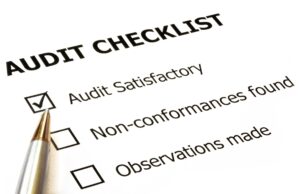Do you REALLY know what’s happening in your lab?
 As a lab manager or owner, you have your finger on the pulse of what’s happening in your laboratory.
As a lab manager or owner, you have your finger on the pulse of what’s happening in your laboratory.
You have your eye on the big picture and introduce improvements to enable your staff to do their jobs and do them well.
But what about those nitty-gritty, everyday issues that arise? Would your staff come to you when those occur?
Well, even if you have an excellent rapport with them, the answer could still be maybe not (for a whole host of reasons).
That’s why carrying out an internal audit is the perfect way to find problems before they occur. And although as the manager you may prefer to always do this yourself, it also makes good sense to have others carry out this role.
It’s not just about trust
The ‘show and tell’ method of internal audits is a tried-and-true way of auditing. It’s certainly the most popular method and used by external bodies such as NATA to good effect.
You would hope that your staff wouldn’t be nervous about having you carry out the audit and that they’d be honest. And this may well be the case.
But having another colleague doing this has many benefits.
This is particularly the case if you’ve been with the lab for some time. That fresh perspective from a different pair of eyes can lead to surprising improvement suggestions.
Your staff will also gain confidence explaining about their work and how they do it. There’s also a level of pride in explaining how you do your job, and this can’t be underestimated.
The person carrying out the audit will also benefit from the exercise. Learning how other parts of the lab or the business work will lead to more understanding and empathy when difficulties arise.
Audits skills and training
 Your internal auditor must have training to carry out the job effectively. As well as general training in auditing skills, consider any new technology that may be in use.
Your internal auditor must have training to carry out the job effectively. As well as general training in auditing skills, consider any new technology that may be in use.
Consider carefully who will be carrying out the audit and if they have the right personality for the job.
To get the best outcome, you should choose someone who is curious, open, and non-judgemental. Also think about whether they:
- Have the people and technical skills and the right mindset
- Know how to ask questions and what questions to ask
- Deal with resistant or reluctant people in a diplomatic manner
- Pay attention to details.
If you’re looking at having a particular process audited that requires specialised skills to understand, then select your auditor with this in mind. If you don’t have anyone on staff with these skills, consider using an external auditor.
Other things to remind the auditor of are confidentiality of information, collecting and documenting information and how to define any issues that may need attention.
These are critical skills for making the most of an internal audit opportunity.
We have an Internal Audits course on 2 March which will help your staff develop all of the skills an auditor will need.
Explain why it’s happening
Ideally you should have a published internal audit schedule that is available to all staff so that the audit isn’t a surprise. But it also makes good sense when final arrangements are being made to confirm that the reason for internal audits isn’t because management wants to go looking for problems. Of course, they want to be sure that the system and processes are working. They want to be sure that requirements of customers are being met and the quality system is doing what it’s designed to do.
It’s important for staff members to learn how accreditation or certification requirements apply in their area. But it’s also useful to remind them that an internal audit isn’t just a compliance tick box exercise – it’s a quality improvement activity. Rather than being reactive, internal audits allow the lab to become proactive with continual improvements at its core.
Communication goes both ways
 By regularly performing audits, staff members will become more experienced and feel better prepared when the external assessment comes around.
By regularly performing audits, staff members will become more experienced and feel better prepared when the external assessment comes around.
It also means that they will feel more confident when explaining their role. They’ll learn how to handle questions and feedback from the auditor.
However, staff should also be encouraged to give feedback on the performance of the auditor. Since auditing probably isn’t their full-time role, this is a learning experience for them too.
You may not need the auditee to complete a formal feedback document. But do make sure they know that they can pass on any feedback about the auditor’s performance to their manager and/or Quality Manager.
The final word
We all know that internal audits are a mandatory part of your lab’s quality system. And as we’ve seen having skilled, capable staff able to carry out audits has many benefits, not least of which is freeing up the manager’s time!
We have a suite of training courses that can help your business to work better and smarter. This includes our Internal Audit training course.
Plus, we can run a face-to-face or online inhouse session for your staff. As well as being a cost-effective option, it also means that your people will benefit from the same information being delivered at the same time.
But if you don’t have the time or resources for training or auditing, we can help there too. We can develop an internal audit schedule (in collaboration with you) that considers your staff and your activities. Then we can carry out those audits for you, which means that you have an efficient and effective solution that ensures you meeting the requirements of NATA or your certification body.
Call Maree (0411 540 709) or Diane (0402 012 781) or email info@masmangementsystems.com.au
You don’t have to do this alone!
Download the article Do you REALLY know what’s happening in your lab?





